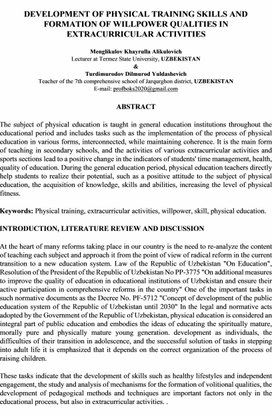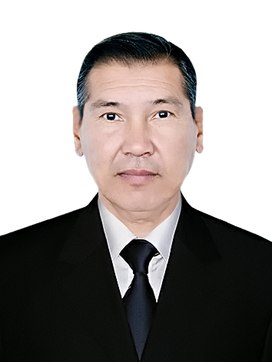DEVELOPMENT OF PHYSICAL TRAINING SKILLS AND FORMATION OF WILLPOWER QUALITIES IN EXTRACURRICULAR ACTIVITIES

DEVELOPMENT OF PHYSICAL TRAINING SKILLS AND
FORMATION OF WILLPOWER QUALITIES IN EXTRACURRICULAR ACTIVITIES
Menglikulov Khayrulla Alikulovich
Lecturer at Termez State University, UZBEKISTAN
&
Turdimurodov Dilmurod Yuldashevich
Teacher of the 7th comprehensive school of Jarqurghon district, UZBEKISTAN
E-mail: profboks2020@gmail.com
ABSTRACT
The subject of physical education is taught in general education institutions throughout the educational period and includes tasks such as the implementation of the process of physical education in various forms, interconnected, while maintaining coherence. It is the main form of teaching in secondary schools, and the activities of various extracurricular activities and sports sections lead to a positive change in the indicators of students' time management, health, quality of education. During the general education period, physical education teachers directly help students to realize their potential, such as a positive attitude to the subject of physical education, the acquisition of knowledge, skills and abilities, increasing the level of physical fitness.
Keywords: Physical training, extracurricular activities, willpower, skill, physical education.
INTRODUCTION, LITERATURE REVIEW AND DISCUSSION
At the heart of many reforms taking place in our country is the need to re-analyze the content of teaching each subject and approach it from the point of view of radical reform in the current transition to a new education system. Law of the Republic of Uzbekistan "On Education", Resolution of the President of the Republic of Uzbekistan No PP-3775 "On additional measures to improve the quality of education in educational institutions of Uzbekistan and ensure their active participation in comprehensive reforms in the country" One of the important tasks in such normative documents as the Decree No. PF-5712 "Concept of development of the public education system of the Republic of Uzbekistan until 2030" In the legal and normative acts adopted by the Government of the Republic of Uzbekistan, physical education is considered an integral part of public education and embodies the ideas of educating the spiritually mature, morally pure and physically mature young generation. development as individuals, the difficulties of their transition in adolescence, and the successful solution of tasks in stepping into adult life it is emphasized that it depends on the correct organization of the process of raising children.
These tasks indicate that the development of skills such as healthy lifestyles and independent engagement, the study and analysis of mechanisms for the formation of volitional qualities, the development of pedagogical methods and techniques are important factors not only in the educational process, but also in extracurricular activities. .
The normative documents stipulate that extracurricular activities are an integral part of the education system, that they are diverse, have different directions and forms, and that participation in them as a lesson is voluntary. The effective use of free time in the process of comprehensive upbringing and development of the younger generation has always been a topical issue in our society. In fact, all the actions of a growing child reflect the educational process, and to make these educational processes more productive.
Foreign authors (Kolbanov V.V.Valeologicheskoe obrazovanie v nachalnoy shkole
/V.V.Kolbanov // Nachalnaya shkola.-1999.-№1 .; Kuindji N.N. Valeology: Puti formirovaniya zdorovya shkolnikov: Metodicheskoe posobie /N.N .Kuidji. –M .: Aspekt press, 2000 .; Sergeeva B.V. Means of formation of zdorovogo obraza jizni mladshix shkolnikov // Problems of pedagogy: nauchno-metodicheskiy zhurnal, 2017-№1; Meykson G.B., Shoulin
V.N. ., Shoulina E.B. Samostoyatelnыe zanyatiya uchashchixsya po fizicheskoy kulture.-M: Prosveshchenie, 1986 .; Vaynbaum Ya.S. Dozirovanie fizicheskix nagruzok shkolni ov, -M: Prosveshchenie, 1991 ;;) partially covered the data on a healthy lifestyle and the ability to engage independently in physical training.The authors on the formation of volitional qualities (Ivannikov V.A. Kolichestvennaya otsenka volevogo usiliya pri napryajennoy fizicheskoy rabote / V.A. Ivannikov, E.V.Eydman // Вопросы психологии.-№5.-1986 .; Ilin E.P. Psychology voli / E.P.Ilin.-SPb .: Peter, 2009 .; Kalin V.K. Psychology voli / V.K.Kalin.Simferopol, 2011 .; Leontev A.N. Deyatelnost.Soznanie.Lichnost / A.N.Leontev.-M .: Smysl, Akademiya, 2005 .; ) in their research work on the formation of the willpower of the child, more research from a psychological point of view, and pedagogical data are scattered, there are uncertainties in the composition and concept of willpower. This is because some researchers believe that the concept of "will" as other personal qualities are in many cases subjective and have no appearance or physiological symptoms, and therefore cannot be measured by anything. which cannot be assessed.
This situation indicates the need for research on the formation of independent training skills and willpower of physical training in extracurricular activities of schoolchildren through pedagogical means.
In the extracurricular circle there are several monographs, methodical recommendations, popular science publications, which include various exercises, trainings and recommendations on the skills of independent training of physical training and the formation of volitional qualities. The scientific works of foreign authors - S.G.Zanin, V.L.Levi, Yu.A.Yurchenko, S.L.Rubinstein - are widely popular among teachers and parents and are used as a guide in realizing the potential of children. in most of these scientific works more emphasis is placed on the formation of willpower and various physical qualities, and little is known about the formation of willpower qualities and the development of independent engagement skills through the means of physical education.
The analysis of scientific and pedagogical research shows that the organization and substantiation of work on the development of independent learning skills of students through physical training in extracurricular activities, which are part of a healthy lifestyle skills, is an urgent problem for teachers.
The problem of the research is the lack of information about the formation and development of physical health in relation to the spiritual, mental, social health of students, which is part of their individual health in the formation of a healthy lifestyle, its development of students' independent exercise skills in extracurricular activities. pedagogical etiquette relevant to the research topic, given the lack of data The analysis of experiments and the selection and experimental testing of pedagogical methods and forms aimed at shaping the healthy lifestyle of students in the extracurricular activities, to determine their dynamics led to research tasks. This situation, despite the importance and significance of the research, has led to the development of healthy lifestyle skills in extracurricular activities, students' independent physical fitness skills, the formation of volitional qualities is almost unexplored and research work and the identification of contradictions in pedagogical practice. these contradictions: - Lack of mechanisms by our society to form the skills of the younger generation to become healthy, spiritually and physically strong, intellectually gifted;
- Lack of information on the organization of extracurricular activities aimed at developing the skills of independent living in a healthy lifestyle and independent physical training and justification with the results of scientific research;
- The possibilities of the means of physical education in the formation of volitional qualities and the incomplete theoretical development of pedagogical conditions for these purposes; - The need of teachers and parents for an active and purposeful means of physical education in the rapid formation of volitional qualities in students and the inconsistency of recommendations in ensuring the pedagogical process;
- The need for an objective assessment of the level of formation of volitional qualities in students and the lack of tools (forms, methods, pedagogical cooperation and methods) to assess this indicator;
These contradictions describe the research problem, the scientific novelty of the research, the development of skills for independent participation in physical education in extracurricular activities as an element of educational work in secondary schools and the development of a model of volitional qualities, scientific substantiation and practical application of teachers. indicates that recommendations should be made for.
In determining the level of study of the subject, the authors studied a large number of specialized scientific literature on extracurricular activities (AV Keneman, GV Khukhlaeva, EI Aragofskaya, AH Gussmov) and the process of developing skills of independent practice (G .B.Maxon, V.N.Shoulin, M.I.Polyakov, V.F.Treshchalin, G.N.Semenova), acceleration of will (V.A.Ivannikov, V.L.Khaikin and others), preschool age Formation and development of the will in children (LI Bojovich, AV Vedenev, LB Obukhova), the genesis of the formation of a strong will
(A.G.Maklakov, K.Makgonigal, A.K.Osnitsky, etc.) revealed the lack of a combined pedagogical approach, methods and techniques for the formation of their volitional qualities, while developing students' skills of independent physical training in extracurricular activities.
The authors aimed to use the following methods in solving the tasks:
-analysis of scientific and methodological literature,
-conducting surveys and questionnaires,
-pedagogical observation and analysis, -create an experimental group of students, -take tests.
Analyzing all the above indicators, the authors aimed to develop skills of independent practice in extracurricular activities using goal-oriented physical education tools and to develop a model for the formation of volitional qualities in the process, experimental testing and theoretical substantiation.
REFERENCES
1. Сергеева Б.В. Средства формирования здорового образа жизни младших школьников // Проблемы педагогики:научно-методический журнал, 2017-№1.
2. Мейксон Г.Б.,Шоулин В.Н.,Шоулина Е.Б. Самостоятельные занятия учащихся по физической культуре.-М: Просвещение, 1986.
3. Вайнбаум Я.С. Дозирование физических нагрузок школьников,-М: Просвещение, 1991.
4. Иванников В.А. Количественная оценка волевого усилия при напряженной физической работе / В.А.Иванников, Э.В.Эйдман // Вопросы психологии.-№5.1986.
5. Ильин Е.П. Психология воли / Е.П.Ильин.-СПб.: Питер, 2009.
6. Леонтьев А.Н. Деятельность.Сознание.Личность / А.Н.Леонтьев.-М.: Смысл, Академия, 2005.
7. Ашмарин Б.А. Теория и методика педагогических исследований в физическом воспитании, - М.: Физкультура и спорт, 1978.
© ООО «Знанио»
С вами с 2009 года.
![]()

